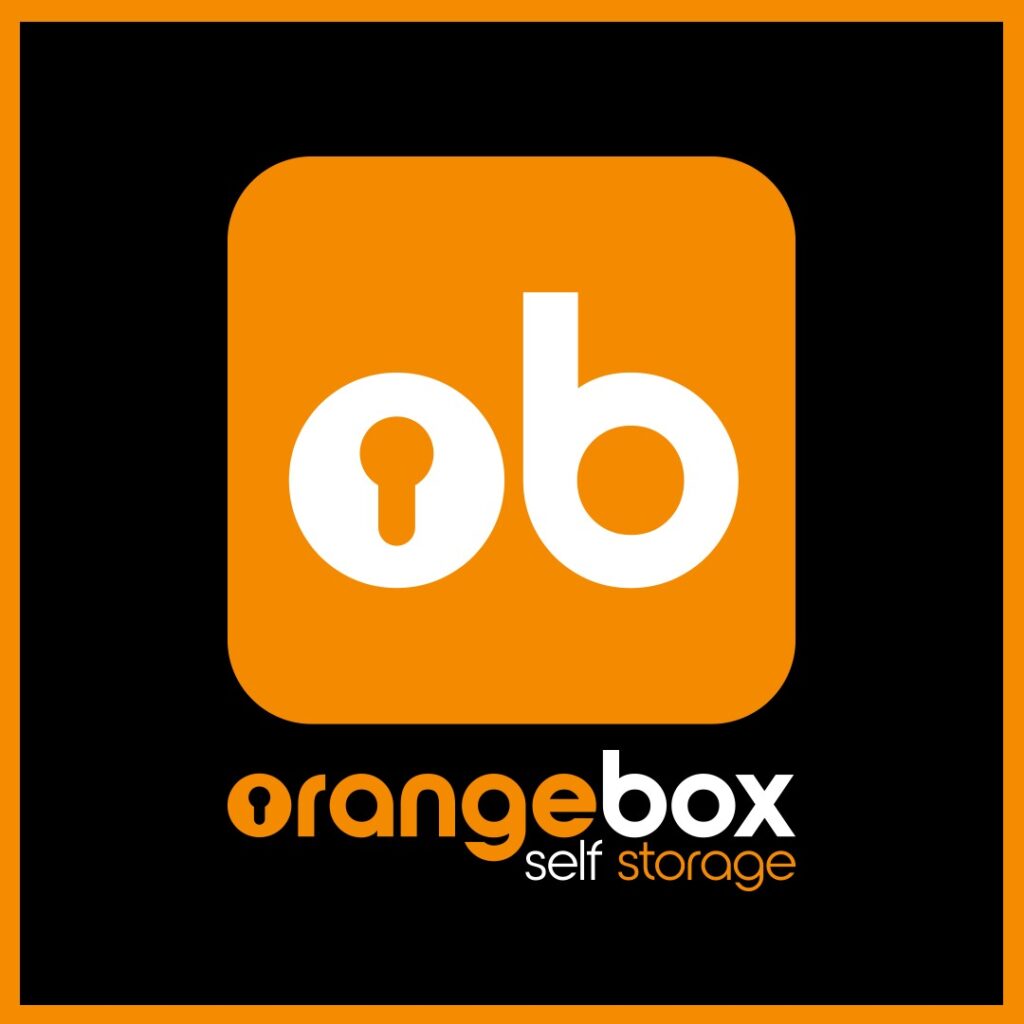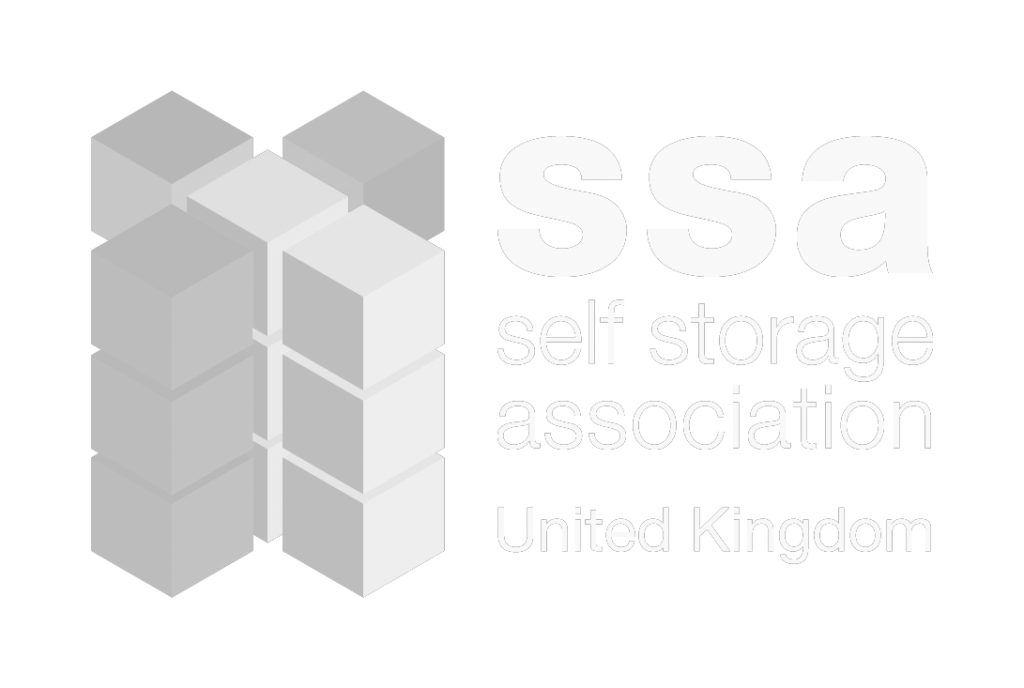Let's be honest, modern life can feel a bit cramped. Whether you're a student living in a shoebox between terms, a family bursting at the seams, or a business that's outgrowing its current space, finding the right storage in Leeds is often less of a luxury and more of a necessity. The city is growing fast, and with that comes a soaring demand for secure, flexible space.
Why Leeds Is a Prime Location for Storage
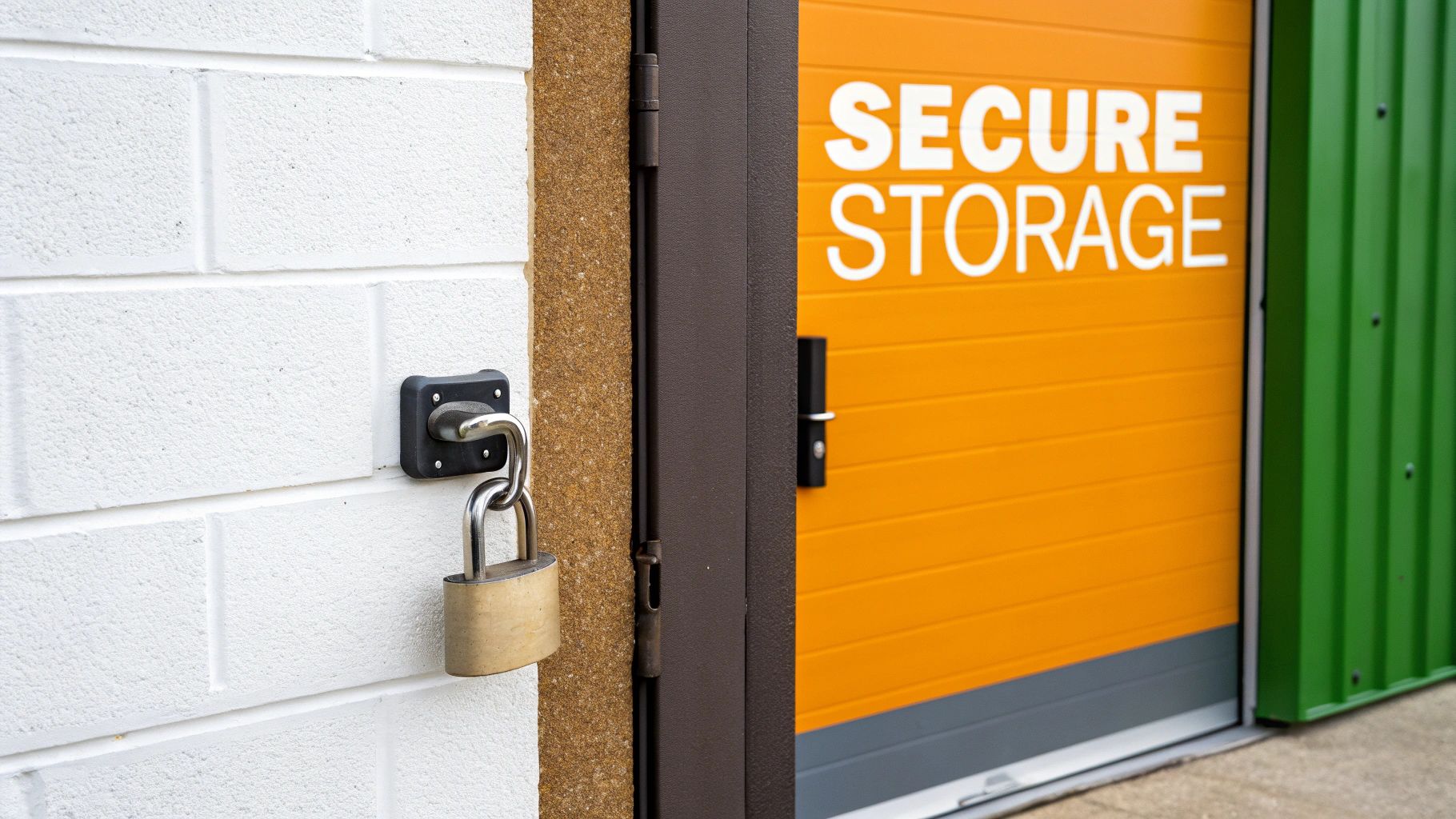
Leeds isn't just another city; it's a buzzing economic hub right in the heart of Yorkshire. All this activity creates a constant, very real need for a bit of extra room. Just think about the thousands of students at its universities who need somewhere to stash their stuff over the summer. Or the young professionals moving into those stylish city-centre flats where every square foot is precious.
And it’s not just about personal space. The city's business scene is thriving, from small e-commerce startups run from a spare room to established tradespeople needing a base for their tools and materials. Self-storage offers them a practical way to scale up without committing to an expensive, long-term commercial lease.
The Drivers of Demand in Leeds
A few key things have come together to make Leeds a real hotspot for storage:
- A Growing Urban Population: More people are choosing to live in and around the city centre, which means living space is at a premium. A storage unit basically becomes an extension of your home, perfect for decluttering or making a house move less chaotic.
- A Booming E-commerce Scene: Local online sellers need a place to keep their stock. A secure storage unit is the ideal mini-warehouse, letting them handle inventory without the massive overheads of a proper facility.
- Vibrant Student Community: With several major universities, Leeds has a huge student population that comes and goes, creating a predictable wave of demand for affordable, secure storage between academic years.
A Hub for Logistics and Growth
The city’s spot on the map makes it even more important. Leeds is a critical centre for transport and logistics, and the numbers back this up. Back in 2021, Leeds had one of the highest concentrations of transport and storage businesses in the UK, with around 3,100 sites.
Nationwide, this sector saw an incredible 88% growth between 2011 and 2021, which really underlines the city’s expanding role as a key logistical player. You can explore more data on this significant growth trend.
This mix of a dense, modern city and a powerful business engine means that searching for good storage in Leeds is a journey many people find themselves on. It’s all about creating a bit of breathing room in a city that never stops moving.
This guide is here to help you figure it all out. We’ll give you clear, practical advice to find the perfect storage solution for whatever you need, whether it’s for your home or your business.
Choosing the Right Type of Storage Unit
Picking the right storage unit is a lot like choosing a suitcase for a trip. Go too small, and you’ll find yourself struggling to squeeze everything in. Go too big, and you're just paying for empty space you don't need. When you start looking for storage in Leeds, getting to grips with the different types and sizes on offer is the best first step you can take.
It’s easy to get bogged down in square footage and jargon. Instead, let's think in real-world terms. Picture the smallest units, around 25 sq ft, as a roomy walk-in wardrobe. They're spot-on for students needing to stash books, a desk, and a few boxes over the summer, or for anyone looking to finally clear out that cluttered spare room.
At the other end of the scale, a large 150 sq ft unit is about the size of a single-car garage. You can comfortably fit the entire contents of a three-bedroom house in there, making it a lifesaver for families during a house move or a major renovation. Visualising your stuff in these familiar spaces makes it much easier to figure out what size you actually need.
This image gives you a great visual guide to how different unit sizes stack up.
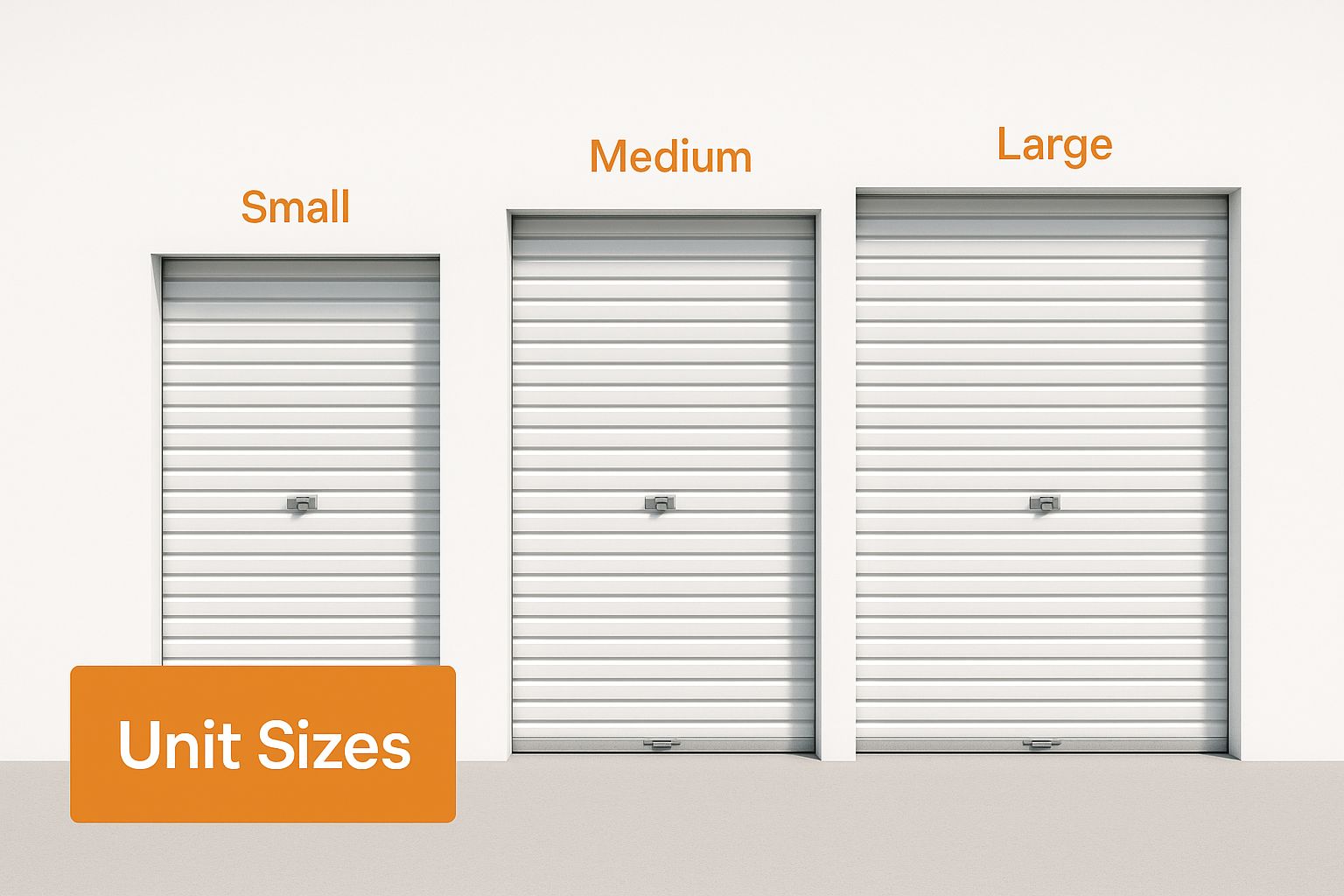
Seeing them side-by-side helps put their capacity into perspective, ranging from closet-sized nooks to garage-sized spaces.
To make it even simpler, here's a quick guide to what you can expect to fit into the most common unit sizes you'll find around Leeds.
A Quick Guide to Common Storage Unit Sizes
| Unit Size (sq ft) | Real-World Analogy | Ideal For Storing |
|---|---|---|
| 25 sq ft | Large Walk-In Wardrobe | A few dozen boxes, a small desk, chair, and personal effects. Great for students. |
| 50 sq ft | Garden Shed | Contents of a studio flat, including a sofa, mattress, and several boxes. |
| 100 sq ft | Half a Single Garage | Furnishings from a one or two-bedroom flat, plus appliances and boxes. |
| 150 sq ft | Standard Single Garage | Everything from a typical three-bedroom house, including large furniture and appliances. |
Hopefully, that gives you a clearer picture. Now, let’s dig into the types of units available.
Indoor Units for Secure and Stable Storage
Indoor storage units are exactly what they sound like—units located inside a larger, secure building. This gives your belongings an extra layer of defence against the famously unpredictable Leeds weather, which is a big plus for anything that doesn't handle damp or temperature swings well.
Think about items like:
- Wooden Furniture: Prone to warping or cracking if humidity levels fluctuate.
- Electronics and Appliances: Moisture can wreak havoc on sensitive components.
- Important Documents and Archives: Paper degrades surprisingly quickly in damp conditions.
- Textiles and Clothing: Susceptible to mould and mildew if not kept perfectly dry.
Because they’re tucked away inside a facility with controlled entry, indoor units tend to offer greater peace of mind. They are a solid, all-around choice for most personal and business storage needs. Choosing correctly from the get-go is key, so it's worth reading up on the 8 common storage unit mistakes and how to avoid them before you sign on the dotted line.
Container Storage for Durability and Access
Container storage, sometimes called outdoor or drive-up storage, brings a different set of benefits to the table. These are robust steel containers, usually at ground level, that let you drive your car or van right up to the door. No corridors, no lifts, just direct access.
This makes them a fantastic option for:
- Tradespeople: Storing tools, equipment, and materials you need to grab on the way to a job.
- E-commerce Businesses: Quickly loading and unloading stock without a fuss.
- Storing Bulky Items: Perfect for garden furniture, large appliances, or even a vehicle.
While they provide brilliant protection from the elements, they don't have the same temperature stability as an indoor unit. They're built for toughness and convenience, making them a practical choice for items that aren't too fussy about temperature changes. If you're weighing up different business options, it helps to understand the key differences between warehousing and storage.
Key Takeaway: The choice between indoor and container storage isn’t about which is ‘better’. It’s about which is better for your stuff. Prioritise protection for delicate goods and easy access for bulky, frequently used items.
Climate-Controlled Storage for Ultimate Protection
For your most valuable, sentimental, or irreplaceable belongings, climate-controlled storage is the gold standard. These units take things a step beyond standard indoor units by actively maintaining a consistent temperature and humidity level all year round.
You should seriously consider this option if you're storing:
- Antiques and Artwork: Fluctuations in temperature and humidity can cause permanent damage.
- Musical Instruments: Especially wooden instruments like pianos, violins, and guitars.
- Vinyl Records or Collectables: Warping and degradation are huge risks in a standard unit.
- Sensitive Business Inventory: Think pharmaceuticals, electronics, or cosmetics that need stable conditions.
Yes, they might cost a little more, but that investment buys you the assurance that your most precious items will stay in the exact condition you left them. For anyone looking for storage in Leeds to protect sensitive goods, asking about climate control is a must. It’s the smartest way to guard against the long-term effects of the UK’s damp climate.
Understanding the Real Cost of Storage
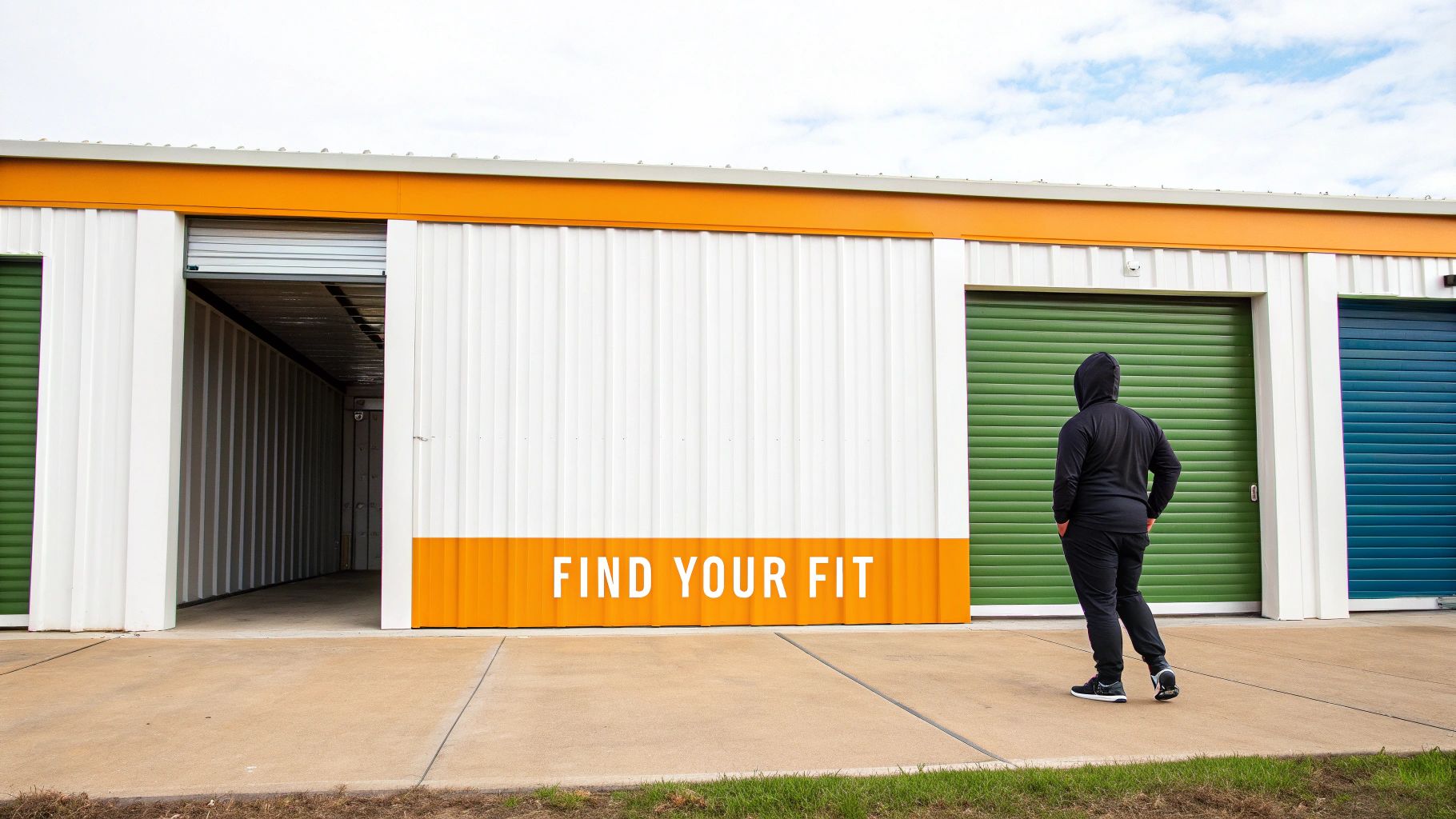
When you start looking for storage in Leeds, it's easy to get fixated on the weekly or monthly price you see on a billboard. But that headline number is just the beginning. The final figure you pay is shaped by a lot more than just the size of the unit.
Think of it like booking a flight. The base fare gets you on the plane, but extras like choosing your seat or checking a bag will change the final bill. The same logic applies here. Understanding these moving parts from the get-go helps you budget properly and avoid any unwelcome surprises down the line. It means you can compare facilities on a true like-for-like basis and find genuine value, not just a low initial quote.
Key Factors That Influence Price
Beyond the square footage, a few crucial elements will determine your monthly storage costs. Knowing what they are puts you in a much stronger position to choose the right option for both your stuff and your wallet.
Here are the main drivers to keep in mind:
- Location: Just like with property, location is everything. A facility in a prime, central Leeds spot will naturally cost more than one on the outskirts, thanks to higher land values and sheer convenience.
- Access Hours: Do you need to get to your things at the crack of dawn or late at night? Facilities offering genuine 24/7 access often charge a premium for that flexibility compared to those with standard business hours.
- Security Level: While all good facilities are secure, those with advanced features like individually alarmed units, high-tech access control, and comprehensive CCTV monitoring might have slightly higher prices to cover these top-tier systems.
- Contract Length: How long you plan to stay plays a huge part. Shorter, more flexible month-to-month contracts usually come with a higher monthly rate.
If you know you'll need storage for a while, committing to a longer term can unlock some serious savings. It's always worth exploring options for long-term storage in Leeds if you anticipate needing a unit for several months.
Navigating the Leeds Storage Market
So, what should you actually expect to pay? Prices for storage in Leeds are generally more moderate than in London but still reflect the city's status as a major northern hub. The UK storage market has seen steady growth, with national average costs hitting around £29.13 per square foot annually.
While London is still the priciest area, cities like Leeds haven't been immune to price increases. The North of England saw a 5.5% rise in storage costs, keeping pace with wider inflation. This gives you some useful context when you're comparing quotes from local providers. For a deeper dive into UK-wide trends, this self-storage price analysis is a helpful read.
Don’t just look at the weekly rate. A slightly more expensive unit with better security, 24/7 access, and a convenient location might offer far better overall value for your specific needs.
Insider Tips for Getting the Best Deal
Finding a great deal on storage in Leeds is about more than just grabbing the first quote you see. The advertised price isn't always set in stone, and a bit of savvy planning can help you manage your costs effectively.
Here’s how to be a smart storage shopper:
- Look for Introductory Offers: Many facilities have fantastic deals like "first month for £1" or "50% off for the first eight weeks." These are brilliant for short-term needs, but always check the standard rate you'll be paying afterwards.
- Ask About Long-Term Discounts: If you know you’ll need storage for six months or more, always ask if they offer a discount for prepayment or a long-term contract. It's often one of the easiest ways to lower your monthly outflow.
- Clarify Insurance Requirements: Most facilities will require you to have insurance—and it’s a sensible way to protect your belongings anyway. First, check if your home contents insurance already covers items in storage. If not, be sure to factor the facility's insurance cost into your total budget.
- Avoid Paying for Unused Space: This one is simple but crucial. Take the time to accurately estimate the unit size you need. Paying for a 100 sq ft unit when a 75 sq ft one would do is like leaving a light on in an empty room—a total waste of money. Use online size estimators or chat with the staff for guidance.
By keeping these points in mind, you can look beyond the headline price and find a storage solution that truly fits both your belongings and your budget.
What to Look for in a Secure Storage Facility
When you put your things in storage, you're doing more than just renting space. You're handing over items that mean something to you, whether it’s their financial value or the memories they hold. Real peace of mind comes from knowing the facility you’ve picked is genuinely secure. When you're looking for storage in Leeds, it's crucial to find a provider who sees security as their number one job, not just a tick-box feature.
A top-notch security system works in layers, a bit like the walls of a medieval castle. Each layer is there to stop unauthorised access, and together they create a pretty tough defence. Your belongings are the treasure in the innermost keep, shielded by multiple safeguards. This layered approach is the true sign of a secure site.
The Foundations of Facility Security
Before you even think about the individual units, the first line of defence is the facility's perimeter. It's the outer wall of your castle. This is where a solid security foundation begins, and it sets the tone for the entire site's safety standards.
When you visit a potential facility, keep an eye out for these fundamentals:
- Robust Perimeter Fencing: This needs to be more than a flimsy chain-link fence. Look for high, sturdy fencing that’s well-maintained, with no obvious weak spots or damage.
- Controlled Gate Access: A single, controlled entry and exit point is vital. Modern facilities use electronic gates that need a unique PIN, key fob, or access card, making sure only customers and staff can get inside.
- Comprehensive Lighting: A well-lit facility is a massive deterrent to intruders. Notice if the driveways, building exteriors, and corridors are brightly lit, especially after dark.
These features all work together to make sure the only people on-site are the ones who are meant to be there.
Advanced On-Site Monitoring and Protection
Once you get past the perimeter, the next layers of security kick in. This is where technology provides constant oversight and an immediate response to any potential problems. Think of it as the digital version of having guards patrolling the castle walls, 24/7.
A truly secure facility doesn't just react to problems; it actively monitors and deters them. Every security feature should work in concert, from the front gate to the lock on your individual unit door.
Key monitoring systems to look out for include:
- 24/7 CCTV Surveillance: Cameras should be placed strategically to cover all key areas—the entrance gate, loading bays, hallways, and the grounds outside. It’s worth asking if the footage is monitored live and how long they keep it.
- Individual Unit Alarms: This is a premium security feature that offers incredible peace of mind. Each unit has its own alarm that goes off if the door is opened without the correct access code being used first.
- On-Site Staff Presence: Having staff around during business hours adds a human layer of security. They can keep an eye on things, help customers, and respond quickly to any alerts or strange behaviour.
This constant surveillance creates a detailed record of everyone coming and going, acting as a powerful deterrent.
Making Your Final Checks
Before you commit, don't be shy about asking specific questions. Ask about their procedures if there’s a security breach or what happens when an alarm is triggered. How they answer can tell you a lot about how seriously they take security. A reputable provider will be more than happy to walk you through their systems.
For many, the final decision comes down to the level of protection needed for their specific items. If you’re storing valuable furniture, electronics, or business stock, the features found in a purpose-built facility are hard to beat. You can learn more about secure indoor storage to see how these advanced features come together to protect what's important to you from both theft and the elements. By making security a priority in your search for storage in Leeds, you're making sure your things will be there just as you left them.
How Businesses in Leeds Can Use Storage to Grow
For any business owner in Leeds, every square foot of commercial space comes at a premium. Self-storage offers a clever way out of rigid, expensive leases, acting not just as a back room but as a strategic tool for growth, agility, and efficiency. It’s all about creating operational breathing room in a competitive market.
Think of a local e-commerce brand based in Headingley. Instead of getting locked into a costly warehouse lease, they can use a secure storage unit as a dynamic fulfilment centre. They can scale their space up during the hectic Christmas period and dial it back down in quieter months, matching overheads directly to their sales flow. That kind of flexibility is a complete game-changer for managing cash flow.
Or what about a self-employed plumber or electrician from Armley? They could use a drive-up container unit as a secure base of operations. It keeps thousands of pounds worth of tools and materials safe, organised, and out of the van overnight. This slashes the risk of theft and makes it easy to grab exactly what’s needed for the day's jobs, saving valuable time.
Unlocking Strategic Business Advantages
Using storage isn’t just about stashing things away; it's an active business strategy. It allows companies to operate more nimbly and respond quickly to market changes without being tied down by long-term property commitments that can stifle growth.
This approach offers several key benefits:
- Cost-Effective Scalability: Need more space? Renting a larger unit is simple and fast. You can upgrade in days, not months—something that’s impossible with a traditional commercial lease.
- Inventory Management: Businesses can buy stock in bulk when prices are low and store it securely, which helps improve profit margins down the line.
- Document Archiving: Free up expensive office space by securely storing essential documents and archives off-site, while still keeping everything accessible when you need it.
- Operational Hub: A storage unit can become a central point for equipment, marketing materials, or seasonal stock, streamlining daily operations.
For enterprises of all sizes, making smart choices about space is crucial. You can explore a variety of options specifically designed for business storage solutions in Leeds to see how a unit could fit into your operational model.
Real-World Applications for Leeds Businesses
The practical uses for business storage are incredibly diverse. Local companies all across Leeds are already using these spaces to gain a competitive edge. It’s a solution that adapts to the specific needs of different industries.
The modern business landscape demands flexibility. A storage unit provides a low-risk, high-reward way to manage physical assets, enabling businesses to pivot and grow without the anchor of a long-term commercial lease.
Imagine a local events company storing tables, chairs, and decorative items between gigs. Or a sales representative keeping their promotional materials and samples in a clean, dry unit near their patch. Even online retailers use them as mini-distribution hubs for packing and shipping orders. This is a practical, ground-level solution that works.
Making Storage Work for Your Business Model
Integrating a storage unit into your business operations is surprisingly straightforward. Start by identifying your primary need—is it for stock, equipment, or archives? Pinning this down will help you determine the right size and type of unit.
Next, think about access. Will you need to get to your items outside of normal working hours? If so, a facility with 24/7 access is essential.
Finally, consider the location. Choosing a facility that’s conveniently located on your daily route can save a significant amount of time and fuel costs, boosting your overall efficiency. By thinking strategically, a simple storage unit transforms from a cost into a powerful asset for any growing Leeds business.
Your Step-by-Step Guide to Finding a Provider
Finding the right storage provider in Leeds pulls together everything we've talked about—size, cost, security, and location. With a straightforward approach, you can go from feeling swamped by options to confidently signing on the dotted line for a unit that’s a perfect fit. This isn't about grabbing the first offer you see; it's about making a smart, informed choice.
Following these steps will ensure you cover all your bases, from what you're storing to the small print on the contract.
Step 1: Start with a Quick Inventory
Before you even start Googling "storage in Leeds," take a minute to figure out exactly what you need to put away. Make a quick list of the big stuff—sofas, beds, white goods, boxes—and try to get a rough idea of how it all groups together. This simple exercise helps you avoid one of the most common and costly mistakes: paying for space you don't actually use.
Once you have your list, use an online storage calculator or the size guide we covered earlier to get a solid estimate. Knowing you need something like a 75 sq ft unit makes your search much more focused and efficient.
Step 2: Research and Shortlist Local Facilities
Now it’s time to see what’s out there in the Leeds area. A quick online search will throw up a list of potential providers. Don't just glance at the homepages; get into their websites to check for the key details.
Create a shortlist of three or four promising facilities. For each one, jot down:
- Location: How convenient is it for you to get to?
- Unit Sizes Available: Do they have the size you've estimated you need?
- Security Features: Do they mention CCTV, gate access, and on-site staff?
- Access Hours: Do their opening times work for your schedule, especially if you need 24/7 access?
This initial homework helps you quickly weed out any providers that just aren't going to work.
Step 3: Read Reviews and Get Real Feedback
Online reviews are your best friend for honest, unfiltered customer feedback. Check out reviews on independent platforms, not just the company’s own website. Look for recurring themes—are people consistently praising the friendly staff, how clean the site is, or the straightforward billing?
Pay close attention to how a company responds to negative reviews. A provider that addresses complaints professionally and offers solutions shows they genuinely care about customer service, which is a massive plus.
Step 4: Visit Your Top Choices
Never, ever rent a storage unit without seeing it first. A site visit is non-negotiable. It's your chance to confirm that the security features you saw online are actually in place and to get a real feel for how well-maintained and clean the facility is.
While you're there, ask a few direct questions:
- Can you walk me through your security procedures?
- What are the exact access hours, and are there any restrictions?
- What are all the costs involved, including any deposits, insurance, or admin fees?
- What's the process for moving out, and how much notice do I need to give?
Step 5: Review the Rental Agreement Carefully
The final step before you commit is to read the contract. Go through the payment terms, notice period, and any rules about what you can and can't store. Make sure you understand the terms around price increases, as some introductory offers can lead to a higher rate down the line. A transparent provider will be more than happy to walk you through the agreement and clear up anything you're unsure about. This final check means no nasty surprises, just total peace of mind.
Got Questions About Storage in Leeds?
Stepping into the world of self-storage for the first time? It’s normal to have a few questions. To help you feel completely confident in your decision, we’ve tackled some of the most common queries people have when looking for storage in Leeds.
Think of this as the final piece of the puzzle, designed to clear up any last-minute uncertainties.
What's the Average Monthly Cost?
It’s tricky to give a single, exact price because it really depends on the facility's location, the unit size you need, and any extra features. But we can give you a general idea to help with your budgeting for storage in Leeds.
A small unit, around 25-50 sq ft, will likely set you back somewhere between £15 to £30 per week. For a medium space (75-100 sq ft), you’re probably looking at the £30 to £50 per week range. If you need something bigger (150 sq ft or more), expect to pay £50+ per week. Just remember to keep an eye out for introductory offers, but always ask what the standard rate will be afterwards.
Do I Really Need Insurance?
In short, yes. Just about every reputable storage facility will insist on it. This isn't them trying to upsell you; it's an essential safety net protecting your stuff from the unexpected, like fire, flooding, or theft.
Before you buy a policy from the storage company, have a quick chat with your current home or contents insurance provider. Many policies already cover items kept in a secure storage unit, which could save you a bit of cash. If not, the facility can sort you out with a tailored plan, just be sure to factor that cost into your budget.
Requiring insurance is the hallmark of a professional storage provider. It shows they're serious about protecting your valuables and making sure you’re covered, no matter what.
What Can't I Store in My Unit?
For everyone's safety, every storage facility has a strict list of prohibited items. These rules are non-negotiable, so it’s crucial to know what’s allowed and what isn't before you start packing.
Here are the usual suspects on the banned list:
- Flammable or Combustible Materials: Think petrol, paint, gas canisters, and fireworks. These are a definite no-go.
- Perishable Goods: Any food that can spoil, attract pests, or create bad smells is not allowed.
- Illegal or Hazardous Items: This covers illegal substances, firearms, explosives, and any toxic materials.
- Living Things: It might sound obvious, but you can’t store animals or plants in a storage unit.
These restrictions are there to prevent fires, infestations, and other hazards that could damage not only your belongings but everyone else's too.
Is 24/7 Access Standard for Leeds Storage?
While a lot of modern facilities do offer round-the-clock access, it's not a standard feature everywhere. Some providers stick to regular business hours, like 9 am to 6 pm, and that’s it.
If you’re a business owner needing to grab stock at the crack of dawn or just someone with a hectic schedule, 24/7 access can be a deal-breaker. Always double-check the exact access hours with any facility you're considering to make sure it fits your life. Never assume access is unlimited—it’s one of the most important questions to ask right at the start.
At Orange Box Self Storage, we believe in clear answers and flexible solutions. If you're ready to find secure, accessible, and affordable storage, explore our options and book your unit online today.


